PDF Active Play for Learning (Jan 2023 QCC Newsletter) View
|

This newsletter will discuss ways to support children's vestibular system development at each age level - infants, toddlers and preschoolers, and present active play movement ideas for each age group.
FACEBOOK SHARE ICON.
|
PDF Active Supervision - April 2019 QCC Newsletter View
|

In this newsletter, we will discuss these active supervision strategies and have included additional tips to keep infants, toddlers, and preschoolers safe.
FACEBOOK SHARE ICON.
|
PDF All in the ‘Ohana View
|

This newsletter will highlight four key elements to keep in mind when working with diverse families.
FACEBOOK SHARE ICON.
|
PDF Art Ideas for Your Program View
|
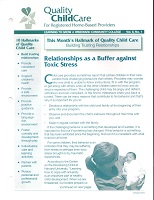
In this newsletter, we will share simple, age-appropriate and affordable art materials and activities that you can do with infants, toddlers, and preschoolers to make art accessible for all the children in your program.
FACEBOOK SHARE ICON.
|
PDF Balancing Different Perspective Volume III. No 7 View
|

This newsletter features ways to partner with families of the children in your care.
FACEBOOK SHARE ICON.
|
PDF Big Body Play View
|

This newsletter explores "Big Body Play", a type of active play that is physical and often rough and tumble. The benefits of such play are discussed, as are common concerns about this type of play and tips for ensuring children's safety.
FACEBOOK SHARE ICON.
|
PDF Born to Sing (QCC Newsletter March 2021) View
|

In this newsletter, we will share how singing helps children’s development, and highlight three types of engaging songs that providers and families can sing with infants, toddlers and preschoolers: lullabies, piggyback songs, and playful songs.
FACEBOOK SHARE ICON.
|
PDF Building Brains with Repetitive Play View
|

This newsletter discusses schema play, a type of repetitive play behavior that is important for brain development. By encouraging their repeated play activities and providing acceptable alternative play activities related to their current schemas, we grow their brain!
FACEBOOK SHARE ICON.
|
PDF Building Literacy through Dialogic Reading (June 2022 QCC Newsletter) View
|

In this newsletter, we will offer tips for book sharing with children at each age level—infants, toddlers and preschoolers. We will also introduce dialogic reading, a book sharing technique especially suitable for toddlers and preschoolers.
FACEBOOK SHARE ICON.
|
PDF Building Resilience (QCC Feb 2021 Newsletter) View
|

In this newsletter we will look at some of the challenges young children might face during this pandemic, define protective factors and describe specific things you can do to provide those protective factors especially during these stressful times.
FACEBOOK SHARE ICON.
|
PDF Building Support for Children's Mental Health View
|

This newsletter will feature the powerful effect that caregivers' relationships and interactions have on emotional well-being, three overarching child care practices that build strong relationships, and nine indicators of responsive caregiving.
FACEBOOK SHARE ICON.
|
PDF Building Trust with Parents of Children with Special Needs View
|
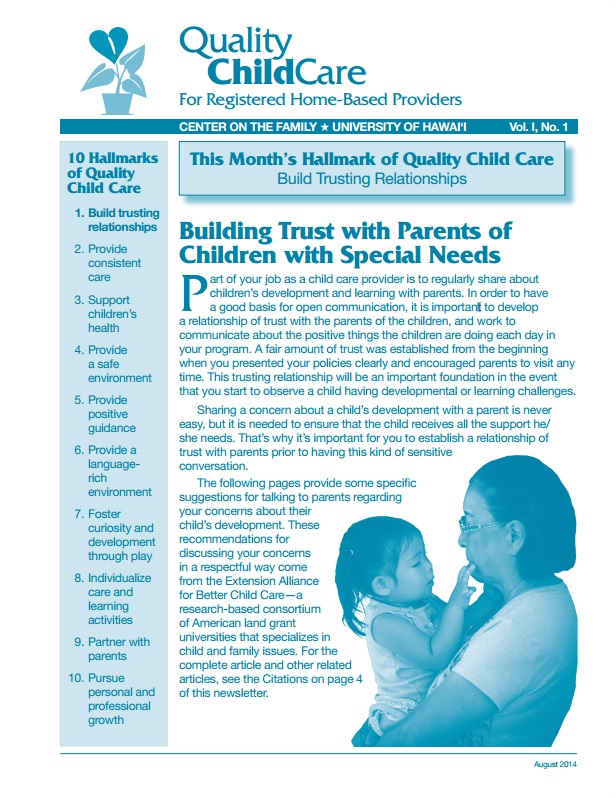
This newsletter focuses on building trusting relationships with the families of children in your care and your role in talking with families about their child's development and any special needs.
FACEBOOK SHARE ICON.
|
PDF Celebrating Culture View
|

This newsletter will share tips on how to support children in embracing their own culture and exploring other cultures through various activities and materials in your program.
FACEBOOK SHARE ICON.
|
PDF Celebrating Dual Language Learners View
|

Becoming multi-lingual is often an asset in the world today. However, it can be difficult to support young children whose home language differs from the one used in the care setting. This newsletter explores language development and the ways in which care providers can support the needs of dual language learners. Benefits and concerns about dual language exposure are addressed.
FACEBOOK SHARE ICON.
|
PDF Children’s Health—Their Skin Tells a Story View
|

This newsletter discusses common skin disorders, both non-contagious and contagious, and the importance of daily health checks when children arrive each day.
FACEBOOK SHARE ICON.
|
PDF Connect with Love Languages View
|

In this newsletter, we will introduce the 5 love languages and ways to use them to connect with infants, toddlers, and preschoolers to individualize your care and response to each child.
FACEBOOK SHARE ICON.
|
PDF Consistent Care - the Key to Helping Children with Social Emotional Difficulties View
|

This newsletter discusses the importance of consistency of care to the development of social emotional skills in young children - especially for children who may exhibit social-emotional difficulties. Resources and tips for addressing these concerns are provided.
FACEBOOK SHARE ICON.
|
PDF Continuing Education - QCC May 2016 Newsletter View
|

This month's issue will focus on our state and national recommendations for knowledge and skills needed by those responsible for the care of young children.
FACEBOOK SHARE ICON.
|
PDF Creating a FCC Business Plan - November 2018 Newsletter View
|

In this newsletter, tips on these sometimes overlooked aspects of business planning will be shared from Tom Copeland’s book “Family Child Care Business Planning Guide.”
FACEBOOK SHARE ICON.
|
PDF Creating a Positive Meal Environment - March 2020 QCC Newsletter View
|
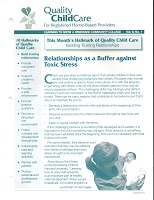
With a mixed age group in your care, there are special considerations in creating a positive meal environment for all children.This newsletter will explore this topic, as well as give age-appropriate activities for infants, toddlers, and preschoolers
FACEBOOK SHARE ICON.
|
PDF Critical Thinking: An Important 21st Century Skill View
|
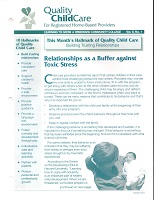
This newsletter will discuss how critical thinking develops and will provide tips and strategies for helping young children learn this skill at each age level– infants, toddlers and preschoolers.
FACEBOOK SHARE ICON.
|
PDF Daycare Dangers that Result in Insurance Claims View
|

This newsletter discusses common safety concerns that could result in injury and insurance claims. Seven common dangers are discussed and safety tips for avoiding these dangers are provided.
FACEBOOK SHARE ICON.
|
PDF Defining and Implementing Developmentally Appropriate Practices - May 2018 Newsletter View
|

In this newsletter, we'll share ideas from professional organizations as well as strategies for how to implement DAP in your program.
FACEBOOK SHARE ICON.
|
PDF Developing and Maintaining a Growth Mindset View
|

This newsletter aims to provide ideas on how to develop and maintain a growth mindset. The key ways to do this are to identify, model and practice it with your keiki.
FACEBOOK SHARE ICON.
|
PDF Dramatic Play Supports Children's Development View
|

In this newsletter, we will share research which describes the: benefits of dramatic play, components of dramatic play, and strategies for facilitating dramatic play.
FACEBOOK SHARE ICON.
|
PDF Early Learning Exposure: Closing the 30 Million Words Gap - March 2018 Newsletter View
|

This newsletter will focus on the “Three T’s”, three steps for ensuring a language-rich environment, adapted from University of Chicago’s “Thirty Million Words Initiative.”
FACEBOOK SHARE ICON.
|
PDF Enhancing Learning with Music View
|
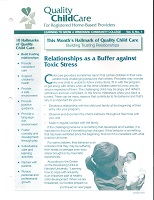
In this newsletter, we introduce ways to use songs, movement, and musical instruments in your daily routine, as well as give you activity ideas to use with infants, toddlers, and preschoolers.
FACEBOOK SHARE ICON.
|
PDF F.O.U.R. Ways to Help Your Child Think Like a Coder View
|

In this newsletter, we will discuss F.O.U.R. ways to help children think like a coder, and present fun and engaging activities you can do with children at each age level -- infants, toddlers and preschoolers -- to help them gain important foundational thinking skills.
FACEBOOK SHARE ICON.
|
PDF Fostering Children's Mathematical Skills Through Everyday Experiences and Play-QCC March Newsletter View
|

Math experiences in the early childhood years can greatly increase the likelihood of success in mathematics.
FACEBOOK SHARE ICON.
|
PDF Fostering Dramatic Play View
|

In this newsletter, we will present tips for setting up the environment, choosing materials, and facilitating dramatic play.
FACEBOOK SHARE ICON.
|
PDF Got Containers? Let's Learn! (April 2022 QCC Newsletter) View
|
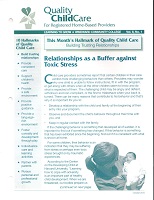
In this newsletter we will provide examples of how familiar containers can support the learning of concepts, deepen critical thinking, and promote creative thinking at each age level – infants, toddlers, and preschoolers. We will also present examples of questions you can pose to spark children’s interest and curiosity to further investigate containers.
FACEBOOK SHARE ICON.
|
PDF Healthy Financial Decisions View
|
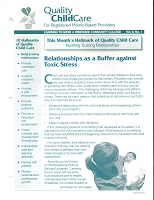
This newsletter will present some business tips to help you make healthy financial decisions for your program. In addition, we’ll share inexpensive activity ideas for infants, toddlers, and preschoolers.
FACEBOOK SHARE ICON.
|
PDF Healthy Relationships (April 2021 QCC Newsletter) View
|

This newsletter will discuss brain development to help you focus on the whole-child rather than the child’s behavior – to build healthy relationships, and help the child develop skills and confidence to be a critical thinker who makes positive choices.
FACEBOOK SHARE ICON.
|
PDF Helping All Children Thrive View
|

This newsletter will share strategies you can use to create an accessible play area; adapt materials in your program, such as blocks, dramatic play, art, and books; and individualize care
FACEBOOK SHARE ICON.
|
PDF Hickory Dickory Dock: Nursery Rhymes Rock! (R.O.C.) View
|

In this newsletter, we’ll expand on the following three important skills that children learn when they hear and recite nursery rhymes. In addition, we will present fun and engaging nursery rhyme activities you can do with children at each age level – infants, toddlers and preschoolers – to help them gain these important foundational skills.
FACEBOOK SHARE ICON.
|
PDF Indoor Movement and Nature Activities View
|

Wouldn’t you love to bottle up the benefits of playing outdoors and bring it indoors on rainy days? There are ways to bring some of the elements of outdoor play to keiki through intentional planning and creativity. This newsletter will provide you with indoor active movement and nature-based play activity ideas for infants, toddlers, and preschoolers.
FACEBOOK SHARE ICON.
|
PDF Keep Fairy Tales N.E.A.R. View
|

In this newsletter, we will further discuss how emotional intelligence develops, and offer tips for using fairy tales to nurture emotional intelligence at each age level – infants, toddlers and preschoolers, using the acronym N.E.A.R. – as a reminder to keep fairy tales near.
FACEBOOK SHARE ICON.
|
PDF Keeping Art Activities Safe View
|

In this newsletter, we’ll show you: Labels to look for when purchasing art materials, Information from Penn State Better Kid Care on the health and safety basics of providing art experiences, Insert: Art materials for infants and toddlers: What’s safe and what’s not.
FACEBOOK SHARE ICON.
|
PDF Keeping it Clean and Green (QCC April 2023 Newsletter) View
|

This newsletter will present information that will help you make the best choices for your program. We will highlight information about chemical fragrances, plastics and plastic toys, and tools for cleaning, sanitizing, and disinfecting.
FACEBOOK SHARE ICON.
|
PDF Keeping Your Brain Healthy & Sharp (Nov 2022 QCC Newsletter) View
|

Whether you are a younger adult or an older adult, practicing these valuable tips will keep your brain sharp and help it to work at its best, while also reducing chronic stress, burnout, and allowing you to engage more effectively with the children in your care.
FACEBOOK SHARE ICON.
|
PDF Language Development in the Media Age- QCC February Newsletter View
|

In this newsletter we will discuss ways to use media that support children's language development.
FACEBOOK SHARE ICON.
|
PDF Learning STEM through Water Activities (Feb 2023 QCC Newsletter) View
|

This newsletter will highlight STEM learning through water activities -- something familiar and accessible for infants, toddlers and preschoolers.
FACEBOOK SHARE ICON.
|
PDF Loose Parts Play - December 2018 QCC Newsletter View
|

This newsletter will discuss how to facilitate loose parts play with infants, toddlers, and preschoolers. Examples that you can include in your child care environment are provided with tips for using these materials effectively.
FACEBOOK SHARE ICON.
|
PDF Making Technology Work for You (QCC May 2021 Newsletter) View
|

We’ll focus on updating business practices in this newsletter: electronic forms and payments, and virtual communication.
FACEBOOK SHARE ICON.
|
PDF Managing Job Stress View
|

This newsletter will discuss some of the ways child care providers can buffer stress and become resilient in the face of the challenges of this work.
FACEBOOK SHARE ICON.
|
PDF Math in Everyday Activities View
|

In this newsletter, we will share ideas to help infants, toddlers, and preschoolers develop number sense, shape recognition, and sorting skills through everyday routine activities.
FACEBOOK SHARE ICON.
|
PDF Math is Everywhere (November 2020 QCC Newsletter) View
|
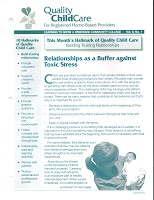
In this newsletter, we will discuss activities that promote the learning of shapes and spatial relationships for infants, toddlers and preschoolers
FACEBOOK SHARE ICON.
|
PDF Middle Ear Infection, Hearing, and Language Development May 2020 QCC Newsletter View
|

In this newsletter, we will present information on how
language develops at each age level – infants, toddlers and
preschoolers, and how a mild or moderate hearing loss can
affect this development. In addition, we will present tips
for minimizing ear infections, as well as strategies to
promote language development in hearing children as
well as those with a hearing loss.
FACEBOOK SHARE ICON.
|
PDF National Accreditation for Family Child Care Providers - QCC April 2018 Newsletter View
|

In this newsletter, we will provide the following information about NAFCC accreditation: Purpose, Philosophy, Content Areas of the Quality Standards, and Self-Assessment Process.
FACEBOOK SHARE ICON.
|
PDF Navigating Power Struggles View
|

This newsletter will share helpful strategies for navigating power struggles through using visual supports, providing two GREAT choices, and diffusing a power struggle with empathy.
FACEBOOK SHARE ICON.
|
PDF Outdoor Activities for Young Children - January 2020 QCC Newsletter View
|

This newsletter will discuss age-appropriate outdoor materials and activities, as well as safety precautions for infants, toddlers, and preschoolers.
FACEBOOK SHARE ICON.
|
PDF Planning Activities with the 4E's (Nov 2021 QCC Newsletter) View
|

In this newsletter, we will discuss steps for lesson planning while keeping the 4 E’s in mind with each age level – infants, toddlers and preschoolers.
FACEBOOK SHARE ICON.
|
PDF Play during a Pandemic (QCC December 2020 newsletter) View
|

This newsletter will discuss strategies for arranging the environment, creating individual activity bins, and implementing activities with infants, toddlers, and preschoolers as a way to get you thinking about how to balance safety, health, and children’s growth and development.
FACEBOOK SHARE ICON.
|
PDF Raising Future Readers (QCC March 2022 Newsletter) View
|
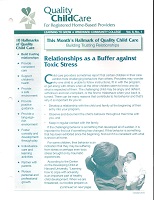
In this newsletter, we will discuss the developmental progression of phonological awareness and alphabet knowledge. We will also share ideas to integrate phonological awareness and alphabet knowledge into daily experiences for infants, toddlers and preschoolers.
FACEBOOK SHARE ICON.
|
PDF Re-evaluating your Emergency Plan View
|

This newsletter will share ways to re-evaluate your plan on an ongoing basis, paying special attention to supporting all children, communication with families, and emergency supplies and records. In addition, we’ll present ways to teach keiki about safe practices during an emergency.
FACEBOOK SHARE ICON.
|
PDF Relationships as a Buffer against Toxic Stress - November 2015 QCC Newsletter View
|

In this newsletter, we’ll describe what is known about how toxic stress brought on by multiple Adverse Childhood Experiences (ACES) affects children’s developing brains and bodies. We’ll conclude with the powerful positive impact your relationships with children have that buffers the potential damage.
FACEBOOK SHARE ICON.
|
PDF Say Okay to Risky Play View
|

This newsletter will delve into risky play – allowing you to reflect on your comfort level to encourage risky play and explore activity ideas of this type of play for all age levels.
FACEBOOK SHARE ICON.
|
PDF Speech and Language Delays (June 2020 QCC Newsletter) View
|

In this newsletter, we will present strategies to help you partner with parents by: being a source of information regarding speech and language development; sharing available resources if a speech or language delay is suspected; working cooperatively to ensure the child receives needed speech and language support.
FACEBOOK SHARE ICON.
|
PDF Support Positive Approaches to Learning Volume III, No. 6 View
|

This newsletter will illuminate important approaches to learning that affect later school success and provide examples of how family child care providers can support chidren's positive approaches to learning.
FACEBOOK SHARE ICON.
|
PDF Supporting Children Through Transitions (QCC December 2022 Newsletter) View
|

This newsletter will discuss two other key ways to support young children’s
ability to have successful transitions at each age level – infants, toddlers and
preschoolers, and present activity ideas for each age group.
FACEBOOK SHARE ICON.
|
PDF Supporting Choosy Eaters View
|
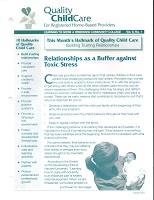
This newsletter will present information that will help you support children’s healthy eating and suggest tips and activities for infants, toddlers, and preschoolers to try new foods.
FACEBOOK SHARE ICON.
|
PDF Teach Children Skills for Making Friends (July 2022 QCC Newsletter) View
|

In this newsletter, we will discuss three recognized strategies that help
children learn these foundational skills:
- Playing games together
- Increasing awareness of social and
emotional cues
- Structuring the learning environment
and daily activities
FACEBOOK SHARE ICON.
|
PDF The Building Blocks of Fine Motor Skills View
|
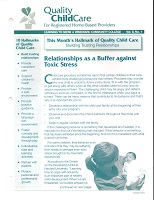
In this newsletter, we will discuss four of the building blocks of fine motor skills as well as share activities that support their development at each age level- infants, toddlers and preschoolers.
FACEBOOK SHARE ICON.
|
PDF The Environment as the 3rd Teacher View
|

This newsletter will share helpful strategies for creating and using visual supports (photos, drawings, objects, gestures, and print) that will guide you in using your environment as the third teacher.
FACEBOOK SHARE ICON.
|
PDF The Magic of Oral Storytelling (QCC Jan 2021 Newsletter) View
|
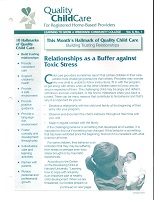
In this newsletter, we will discuss ways ways to make storytelling come alive! We will also share how storytelling can be integrated into daily experiences for infants, toddlers and preschoolers.
FACEBOOK SHARE ICON.
|
PDF The Science of Reading View
|

. In this newsletter, we will introduce some of the Science of Reading strategies to help support children’s language comprehension at each age level -- infants, toddlers, and preschoolers.
FACEBOOK SHARE ICON.
|
PDF The Wonder of Puppets - QCC February 2020 Newsletter View
|

In this newsletter, we will discuss specific ways puppets promote children’s growth and development at each age level -- infants, toddlers and preschoolers, and present tips and ideas for using puppets with each of these age groups.
FACEBOOK SHARE ICON.
|
PDF Tips for Sharing a Developmental Concern with Families (May 2022 QCC Newsletter) View
|

In this newsletter, we will share tips from the Extension’s article as well as share early
intervention programs to familiarize you with resources so that you can present that information to families.
FACEBOOK SHARE ICON.
|
PDF Understanding Autism View
|

This month's newsletter Understanding Autism will feature information to help you support children with autism.
|
PDF Using Positive Guidance to Prepare Children for School View
|

This newsletter discusses the importance of positive guidance for developing social skills, self-regulation and cooperation; all important skills that help to prepare young children to enter school. Examples of how positive guidance is used with different age groups are presented.
FACEBOOK SHARE ICON.
|
PDF What Makes a Family Child Care a Profession? Vol. III No. 8 View
|

In this newsletter, we’ll explore the qualities that define family child care as a bona fide profession and encourages providers to reflect on what they can do to create a professional atmosphere.
FACEBOOK SHARE ICON.
|
PDF When Does Mine Become Ours (QCC March 2023 Newsletter) View
|

In this newsletter we will discuss the 6 stages of social play development and strategies to teach young children to take turns and share
when it is age appropriate.
FACEBOOK SHARE ICON.
|
PDF When Fear Turns into Anxiety View
|

Anxiety becomes a problem when it causes extreme distress or interferes with everyday activities. This newsletter will present information that will help you identify signs of when anxiety may be a concern and strategies to support children who have persistent anxiety.
FACEBOOK SHARE ICON.
|
PDF Why Empathy Matters - July 2019 QCC Newsletter View
|

This newsletter will discuss these foundational pieces to developing empathy, and will present strategies at each age level—infants, toddlers and preschoolers.
FACEBOOK SHARE ICON.
|
PDF “The Big 5” for Preventing Challenging Behaviors View
|

In this newsletter, we will discuss three of “The Big 5” practices: Use a 5:1 ratio of positive attention, teach behavioral expectations, and actively teach social skills along with examples for each age level.
FACEBOOK SHARE ICON.
|













































































